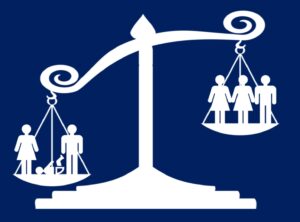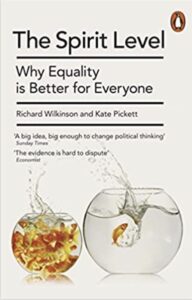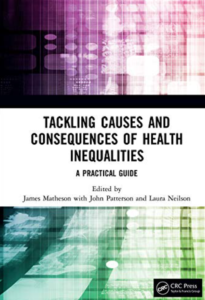Health Inequalities Resources

‘Health inequalities are the unjust and avoidable differences in people’s health across the population and between specific populations’ NHS Scotland
Health inequalities are the ‘avoidable, unfair and systemic differences’* between different groups of people which result in different health outcomes.
Health inequalities are important when considering healthcare law and ethics, as they impact on individual’s underlying health; their access to healthcare and their life expectancy. It is also important that health providers have an understanding of the impact of health inequalities to avoid prejudicial assumptions being made as to why some individuals behave in ways which are detrimental to their health. For example, an understanding of health inequalities helps in an understanding of why individuals smoke; drink excessive alcohol; do not exercise; or eat an unhealthy diet and the barriers beyond the individuals control which prevent them making what might appear to be more healthy life style choices.
On this page you will find links to a range of external resources and suggestions of some books which will assist you in learning more about health inequalities and their impact.
Health Inequalities in a Nutshell, Kings Fund August 2021
This short guide published by the Kings Fund is part of the NHS ‘In A Nutshell Series’ and briefly outlines what health inequalities are and how they are changing.
The Glasgow Effect
This short film illustrates vividly how life expectancy drops dramatically across the city of Glasgow, as socio-economic living conditions deteriorate within the immediate neighbourhood.
The Marmot Review 2010, Fair Society, Healthy Lives
UK government review chaired by Professor Sir Michael Marmot, proposing effective evidence based strategies for reducing health inequalities.
The Marmot Review Ten Years On 2020
A report, with Sir Michael Marmot as lead author, produced by the Institute of Health Equity and Commissioned by the Health Foundation to mark 10 years from the 2010 Marmot Review.
NHS England Definitions of Health Inequalities
What Are Health Inequalities? Public Health Scotland, January 2021
Nuffield Trust, Health Inequalities, Evidence, Policy & Implementation, 2017
A report on health inequalities from the independent health think tank, who aim to improve the quality of health care in the UK through ‘evidence-based research and policy analysis and informing and generating debate’.
NHS Race & Health Observatory
Works to identify and tackle ethnic inequalities in health and care by facilitating research, making health policy recommendations and enabling long-term transformational change.
Health Professional behaviour contributing to health inequalities:
Investigations and research studies have found that on occasions health professionals’ own behaviours can contribute to existing health inequalities.
Treat Me Right (2004) published by Mencap, interviewed 1,000 people with learning disabilities and found that the health inequalities faced by people with learning disabilities, were often used as excuses by health professionals for poor health care in inevitable poor outcomes.
Death by Indifference (2007) also published by Mencap, follows up from Treat Me Right and reports the death of six individuals who lived with learning disability, but died as a result of neglect and what Mencap describe as ‘institutionalised discrimination’.
Death by Indifference; 74 deaths and counting (2012) Mencap, followed.
Moscelli G et al, Socioeconomic inequality of access to healthcare: Does Choice explain the gradient?, Journal of Health Economics, vol. 57, Jan 2018, pp.290-314
The study looked at patients undergoing a routine non emergency procedure, a by-pass or stent for treatment of coronary heart disease, the most common cause of smoking related death and largest single cause of death in UK in 2010.
The study found waiting time difference of up to 35% (43 days) between least and most deprived patients. Only 12% of the difference was attributable to patient choice e.g. more affluent patients choosing and able to travel greater distances for treatment. The remainder attributed to ‘inequalities arising from the doctor-patient relationship’.
Whilst the difference are thought to be due to unintended biases, it is thought the doctors were subjected to more pressure from better educated, better informed patients who were more able to express their needs. The doctors also potentially recognise more privileged patients are better place to litigate if they come to harm, so practise defensive medicine and treat the patient more quickly. Unconscious bias of doctors is also potentially at play with doctors prioritising patients ‘more like me’ and discriminating against patients ‘less like me’.
The best way for health professionals to address behaviours is to acknowledge them and actively avoid them.
Welsh Government Publishes Learning Disability Educational Framework for Healthcare Staff in Wales (June 2021)
The Framework has been developed as an outcome of the Welsh Government’s Improving Lives Programme. It aims to build knowledge, skills and competence across the workforce to reduce health inequalities for people with learning disabilities.
People with Learning Disabilities are recognised as facing the greatest health inequalities compared to others in society. The resources on our Disability Resources Page are therefore also relevant when learning about Health Inequalities.
Some Recommended Books on Health Inequalities:



*As defined by the Kings Fund
AdsFoundation will be running a series of on-line workshops on healthcare law and ethics. Please CONTACT US if you would like to be sent more information about these.
We welcome your feedback on this and all our resources, including information of any additional resources we should include or any changes you think we should make to our existing resources. Please use the CONTACT US tab above to share your thoughts with us. Thank you
BACK TO Health and Care Act 2022 including Integrated Care Systems Resources
FORWARD TO Health Professional Regulation Resources






